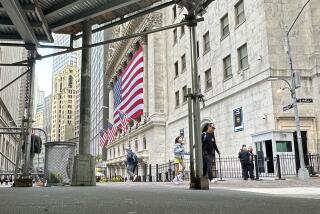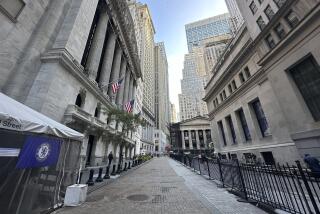Stocks, Bonds Hit Hard by Fed Remarks; Dollar Jumps
Stock and bond prices tumbled Wednesday after Federal Reserve Board Chairman Alan Greenspan warned that the stock market might be too strong and said the central bank is ready to raise interest rates to ward off inflation.
His remarks caused U.S. bonds to post their biggest loss in 11 weeks. The dollar jumped, since higher rates would make the currency more attractive to overseas investors.
The Dow Jones industrial average closed down 55.03 points at 6,983.18, although it rebounded from a loss of more than 120 points.
Greenspan, delivering his semi-annual report on the economy to the Senate, spoke in surprisingly blunt terms of his concerns about the risks of inflation as well as the dramatic increase in stock prices.
The Fed chief “articulated the market’s worst fears,” said Margo Cook, who helps manage $18 billion in bonds for Bank of New York.
The price of the benchmark 30-year bond fell more than a point, its biggest one-day loss since Dec. 11. Its yield, which moves in the opposite direction, rose to 6.78% from 6.66% on Tuesday.
For companies, that means higher borrowing rates. Smith Barney Holdings postponed its planned sale of $250 million of 10-year notes, according to investment bankers familiar with the situation.
Greenspan’s comments may also have hurt demand at the Treasury’s auction of $12.5 billion in five-year notes, which sold at higher-than-expected yields.
In remarks to the Senate Banking, Housing and Urban Affairs Committee, he said that while central bank officials “expect inflation to remain low,” he can’t rule out “a preemptive policy tightening,” or rate increase, even before any sign of faster inflation appears.
So far there’s little evidence that robust economic growth is speeding inflation. The U.S. economy grew at an annual rate of 4.7% in the fourth quarter of last year, while the gross domestic product deflator, an inflation measure, rose at a 1.4% pace--its smallest increase in 30 years.
Wednesday’s stock market slide came one day after the blue-chip Dow index came within 30 points of its Feb. 18 record closing high of 7,067.46, which was its 13th record so far this year.
The Fed chief, whose passing reference to “irrational exuberance” in a December speech sent financial markets reeling, left little question that he remains concerned about the market’s advance and urges caution.
“Such caution seems especially warranted with regard to the sharp rise in equity prices during the last two years,” Greenspan said. “These gains have obviously raised questions of sustainability.”
He also said inflation remains “quiescent” but warned that the Fed might have to raise interest rates in anticipation of inflation.
On the New York Stock Exchange, declining issues outnumbered advancers by more than a 2-1 margin in heavy trading.
The Standard & Poor’s 500-stock index, down nearly 14 points during the afternoon, wound up with a decline of 6.42 points at 805.68. The NYSE composite index fell 3.39 points to 422.14.
The technology-heavy Nasdaq composite index fell 7.14 points to 1,340.55, its fall cushioned by Dell Computer, which rose 3 5/8 to 75 3/4 in the aftermath of late Tuesday’s robust earnings report.
The Russell 2,000 index, considered by investors to be the best measure of small-stock performance, fell 2.94 points to 363.85. Despite the stock market’s partial rebound, analysts said Greenspan appeared to accomplish his goal of talking down the market.
“It looks like Greenspan did a better job of jawboning the market this time,” said Richard Cripps, chief market strategist at Legg Mason Wood Walker.
“I think he’s got the bond market clearly thinking the Fed’s going to raise rates instead of doing nothing, and that’s taken the steam out of this market,” he said.
Among Wednesday’s highlights:
* The Dow’s biggest decliner was McDonald’s, which fell 2 3/8 to 44 7/8 on word that the company may try to boost sales by cutting the price of its Big Mac to 55 cents. The Dow was also weighed down by Texaco, down 2 1/4 at 101 7/8, and Boeing, down 2 1/8 at 104 1/8.
But in defying the Dow’s decline, Philip Morris rose 1/4 to 133 1/2 after announcing a 3-for-1 stock split and an $8-billion stock buyback program.
* A number of technology issues rose. US Robotics gained 4 1/4 to 65 1/4 in electronic trading after 3Com said it would acquire it for $6.6 billion in stock. 3Com ended at 39 when trading was halted.
Compaq Computer rose 7/8 to 81 3/4 and Cisco Systems gained 1 5/8 to 58 1/8.
* Financial companies dropped in reaction to Greenspan’s remarks about interest rates. Bank of New York fell 1 1/8 to 39 1/2, First Union fell 1 3/8 to 90 1/2 and Bank of Boston lost 1 1/4 to 75 1/2.
* Kimberly-Clark rose 3/8 to 106 5/8 after the maker of Huggies diapers and Kleenex said it plans to sell half its paper-pulp operations.
* Broadcaster Clear Channel Communications rose 2 7/8 to 47 after it agreed to buy Eller Media for $1.15 billion in cash and stock.
* Physician Corp. of America lost nearly half its value, falling 1 15/16 to 3 13/16 after it disclosed wider losses at its workers’ compensation insurance unit and said a Florida court ordered it to come up with a reorganization plan for the unit.
In New York currency trading, the dollar traded just below 121 Japanese yen before rebounding to settle at 122.13 yen, up from 121.60 on Tuesday.
Overseas, Tokyo’s Nikkei stock average fell 0.4%, Frankfurt’s DAX index rose 0.1%, and London’s FTSE-100 index fell 0.4%.
Market Roundup, D6
More to Read
Inside the business of entertainment
The Wide Shot brings you news, analysis and insights on everything from streaming wars to production — and what it all means for the future.
You may occasionally receive promotional content from the Los Angeles Times.










